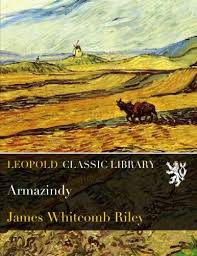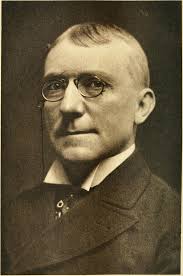Armazindy Page #17
James Whitcomb Riley poems book published in the 1894 book Armazindy and received very negative reviews that referred to poems like "The Little Dog-Woggy" and "Jargon-Jingle" as "drivel" and to Riley as a "worn out genius". Most of his growing number of critics suggested that he ignored the quality of the poems for the sake of making money.
An’ ’tend-like he wuz beat the bass Drum at both ends—an’ toots an’ blares Ole dinner-horn an’ puffs his face— The Little Mock-man on the Stairs! The Little Mock-man on the Stairs Mocks all the peoples all he cares ’At passes up an’ down! He mocks the chickens round the door, An’ mocks the girl ’at scrubs the floor, An’ mocks the rich, an’ mocks the pore, An’ ever’thing in town! “Ho! ho!” says he, To you er me; An’ ef we turns an’ looks, He’s all cross-eyed An’ mouth all wide Like Giunts is, in books.— “Ho! ho!” he yells, “look here at me,” An’ rolls his fat eyes roun’ an’ glares,— “You look like this!” he says, says he— The Little Mock-man on the Stairs! The Little Mock— The Little Mock— The Little Mock-man on the Stairs, He mocks the music-box an’ clock, An’ roller-sofy an’ the chairs; He mocks his Pa, an’ specs he wears; He mocks the man ’at picks the pears An’ plums an’ peaches on the shares; He mocks the monkeys an’ the bears On picture-bills, an’ rips an’ tears ’Em down,—an’ mocks ist all he cares, An’ EVER’body EVER’wheres! SUMMER-TIME AND WINTER-TIME In the golden noon-shine, Or in the pink of dawn; In the silver moonshine, Or when the moon is gone; Open eyes, or drowsy lids, ’Wake or ’most asleep, I can hear the katydids,— “Cheep! Cheep! Cheep!” Only in the winter-time Do they ever stop, In the chip-and-splinter-time, When the backlogs pop,— Then it is, the kettle-lids, While the sparkles leap, Lisp like the katydids,— “Cheep! Cheep! Cheep!” HOME-MADE RIDDLES—ALL BUT THE ANSWERS I No one ever saw it Till I dug it from the ground; I found it when I lost it, And lost it when I found: I washed it, and dressed it, And buried it once more— Dug it up, and loved it then Better than before. I was paid for finding it— I don’t know why or how,— But I lost, found, and kept it, And haven’t got it now. II Sometimes it’s all alone— Sometimes in a crowd; It says a thousand bright things, But never talks aloud. Everybody loves it, And likes to have it call, But if you shouldn’t happen to, It wouldn’t care at all. First you see or hear of it, It’s a-singing,—then You may look and listen, But it never sings again. THE LOVELY CHILD Lilies are both pure and fair, Growing ’midst the roses there— Roses, too, both red and pink, Are quite beautiful, I think. But of all bright blossoms—best— Purest—fairest—loveliest,— Could there be a sweeter thing Than a primrose, blossoming? THE YELLOWBIRD Hey! my little Yellowbird, What you doing there? Like a flashing sun-ray, Flitting everywhere: Dangling down the tall weeds And the hollyhocks, And the lordly sunflowers Along the garden-walks. Ho! my gallant Golden-bill, Pecking ’mongst the weeds, You must have for breakfast Golden flower-seeds: Won’t you tell a little fellow What you have for tea?— ’Spect a peck o’ yellow, mellow Pippin on the tree. ENVOY When but a little boy, it seemed My dearest rapture ran In fancy ever, when I dreamed I was a man—a man! Now—sad perversity!—my theme Of rarest, purest joy Is when, in fancy blest, I dream I am a little boy.
Translation
Translate and read this book in other languages:
Select another language:
- - Select -
- 简体中文 (Chinese - Simplified)
- 繁體中文 (Chinese - Traditional)
- Español (Spanish)
- Esperanto (Esperanto)
- 日本語 (Japanese)
- Português (Portuguese)
- Deutsch (German)
- العربية (Arabic)
- Français (French)
- Русский (Russian)
- ಕನ್ನಡ (Kannada)
- 한국어 (Korean)
- עברית (Hebrew)
- Gaeilge (Irish)
- Українська (Ukrainian)
- اردو (Urdu)
- Magyar (Hungarian)
- मानक हिन्दी (Hindi)
- Indonesia (Indonesian)
- Italiano (Italian)
- தமிழ் (Tamil)
- Türkçe (Turkish)
- తెలుగు (Telugu)
- ภาษาไทย (Thai)
- Tiếng Việt (Vietnamese)
- Čeština (Czech)
- Polski (Polish)
- Bahasa Indonesia (Indonesian)
- Românește (Romanian)
- Nederlands (Dutch)
- Ελληνικά (Greek)
- Latinum (Latin)
- Svenska (Swedish)
- Dansk (Danish)
- Suomi (Finnish)
- فارسی (Persian)
- ייִדיש (Yiddish)
- հայերեն (Armenian)
- Norsk (Norwegian)
- English (English)
Citation
Use the citation below to add this book to your bibliography:
Style:MLAChicagoAPA
"Armazindy Books." Literature.com. STANDS4 LLC, 2025. Web. 11 Jan. 2025. <https://www.literature.com/book/armazindy_946>.




Discuss this Armazindy book with the community:
Report Comment
We're doing our best to make sure our content is useful, accurate and safe.
If by any chance you spot an inappropriate comment while navigating through our website please use this form to let us know, and we'll take care of it shortly.
Attachment
You need to be logged in to favorite.
Log In